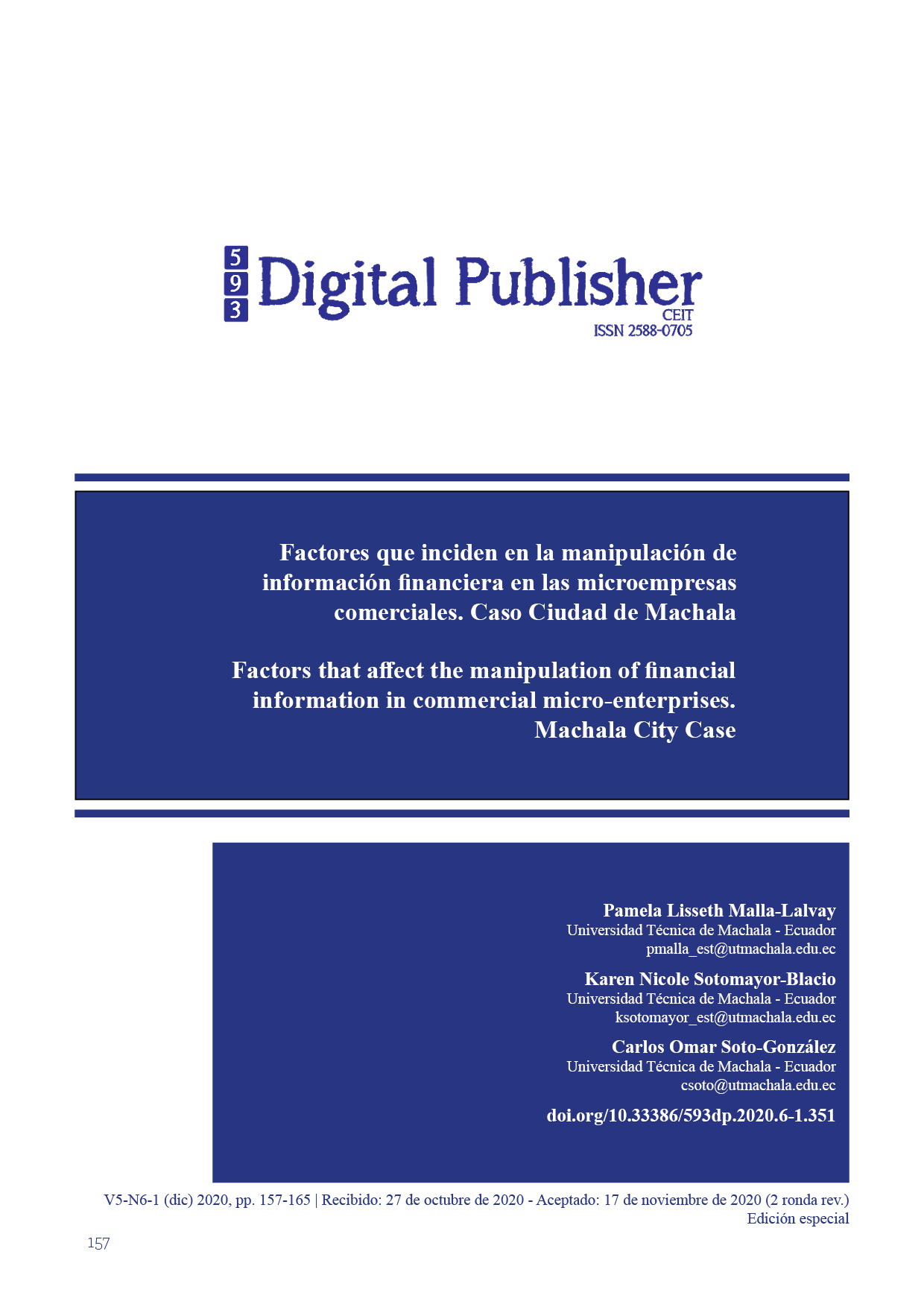Factors that affect the manipulation of financial information in commercial mi-cro-enterprises. Machala City Case
Main Article Content
Abstract
The objective of this study is to analyze those aspects that influence an inefficient handling of information of financial interest that involves commercial micro-enterprises in Cantón Machala. The research is framed within a cross-sectional approach, that is, data provided by the companies from the period of time from 2017 to 2019 is considered, based on these elements and with the support of secondary data, a method is selected qualitative type, thanks to the support of structured interviews, directed towards the representative of the accounting area, in addition the study is complemented with a quantitative type model, the sample considered for the study is 50 commercial micro-enterprises according to the Superintendency of Companies Later, a survey file was structured to extract the research findings. The main results show that micro-enterprises constitute small structures, in the introduction and growth stage within the market, they manage and present their financial-accounting information with the advice of a private accountant, lacking an accounting program that allows a better organization of resources, in turn, the presentation of reports and audits is carried out in an inefficient and disorganized way.
Downloads
Article Details

This work is licensed under a Creative Commons Attribution-NonCommercial-ShareAlike 4.0 International License.
1. Derechos de autor
Las obras que se publican en 593 Digital Publisher CEIT están sujetas a los siguientes términos:
1.1. 593 Digital Publisher CEIT, conserva los derechos patrimoniales (copyright) de las obras publicadas, favorece y permite la reutilización de las mismas bajo la licencia Licencia Creative Commons 4.0 de Reconocimiento-NoComercial-CompartirIgual 4.0, por lo cual se pueden copiar, usar, difundir, transmitir y exponer públicamente, siempre que:
1.1.a. Se cite la autoría y fuente original de su publicación (revista, editorial, URL).
1.1.b. No se usen para fines comerciales u onerosos.
1.1.c. Se mencione la existencia y especificaciones de esta licencia de uso.
References
Abernethy, M., Bouwens, J., & Kroos, P. (2017). Organization identity and earnings manipulation. Accounting, Organizations and Society, 58, 1-14. doi:https://doi.org/10.1016/j.aos.2017.04.002
Bermejo, M. (2015). Consecuencias de la manipulación contable desde la perspectiva del accionista y del stakeholder dentro de la empresa familiar. Granada: Universidad de Granada. Obtenido de http://hdl.handle.net/10481/39871
Bernal, A., & Serrano, J. (2020). Calidad de la información contable y esfuerzo del auditor. Small Business International Review,, 4(1), 52-68. Obtenido de https://sbir.upct.es/index.php/sbir/article/view/244
Cardona, J., Gómez, A., & Cano, A. (2019). Impacto de los estándares internacionales de información financiera en la calidad contable: evidencia desde Latinoamérica y el Caribe. Contaduría y administración, Vol. 64(Nº. 4), 1-37. Obtenido de https://dialnet.unirioja.es/servlet/articulo?codigo=7083641
Centurion, R. (2016). La formalización, financiamiento, capacitación,competitividad y la rentabilidad en las micro y pequeñas empresas, chimbote, 2010-2013. In Crescendo, 50-63.
Fuertes, J. (2016). Manipulación de las ganancias y su impacto en la información financiera. Gestión Joven(15), 36 - 43 . Obtenido de https://dialnet.unirioja.es/servlet/articulo?codigo=6433759
Gómez, V. M. (2016). NIIF y MIPYMES: retos de la contabilidad para el contexto y la productividad. Cuadernillos de Administración, 49-76. Obtenido de https://www.redalyc.org/pdf/205/20548869006.pdf
Hernández, C., Losada, N., & Orozco, D. (2019). La influencia de la contabilidad creativa en la ética profesional del contador público. Revista de Investigación Desarrollo e Innovación: RIDI, Vol. 10(Nº. 1), págs. 53-65. Obtenido de https://dialnet.unirioja.es/servlet/articulo?codigo=7418249
Hernández, O. (2016). La auditoría interna y su alcance ético empresarial. Actualidad Contable Faces, 19(33), 15-41. Obtenido de https://www.redalyc.org/pdf/257/25746579003.pdf
Navarro, O., Lopez, M., & Perez, M. (2017). Normas de Control Contable. Revista Universidad y Sociedad, 1-47. Obtenido de http://scielo.sld.cu/pdf/rus/v9n3/rus07317.pdf
Peralta, B. D., & Loaiza, R. F. (2017). Selección e implementación de Sistemas de Información Contable y Administrativo: una herramienta para la competitividad de las Mipymes. Revista Visión Contable, 10-29. Obtenido de https://publicaciones.unaula.edu.co/index.php/VisionContable/article/view/471/533
Pérez, G. A., Brusca, A. I., & Moneva, A. J. (2006). Utilidad de la información financiera para la gestión de las. Revista de Contabilidad, 9(18), 87-109. Obtenido de https://www.redalyc.org/articulo.oa?id=359733628004
Pico, E., & Núñez, S. (2018). El software contable como herramienta técnica en las microempresas de la provincia de Santa Elena, Ecuador. Killkana sociales: Revista de Investigación Científica, Vol. 2(Nº. 1), 21-26. Obtenido de https://dialnet.unirioja.es/servlet/articulo?codigo=6353057
Prado, R., Elvira, C., Castro, A., & Oscar, F. (2016). Programa para aumentar la conciencia tributaria. Universidad Cesar Vallejo. Obtenido de https://www.redalyc.org/articulo.oa?id=521754663014
Puerta, F., Vergara, A. J., & Huertas, C. N. (2018). Análisis fi nanciero: enfoques en su evolución. Criterio Libre, 85-104. Obtenido de https://dialnet.unirioja.es/servlet/articulo?codigo=6676021
Serrano, P., Señalin, L., Vega, F., & Herrera, J. (2018). El control interno como herramienta indispensable para una gestión financiera y contable eficiente en las empresas bananeras del cantón Machala (Ecuador). Espacios, 39(3), 1-13. Obtenido de https://www.researchgate.net/profile/Jonathan_Herrera2/publication/324170088_El_control_interno_como_herramienta_indispensable_para_una_gestion_financiera_y_contable_eficiente_en_las_empresas_bananeras_del_canton_Machala_Ecuador/links/5ac36b26aca27222c75d
SUPERCIAS. (2016). Reglamento Sobre Auditoría Externa De La Superintendencia De Compañías, Valores Y Seguros. Quito: Superintendencia de Compañias. Obtenido de SUPERCIAL: https://www.mgiecuador.com/docs/SCVS-INC-DNCDN-2016-011.pdf




